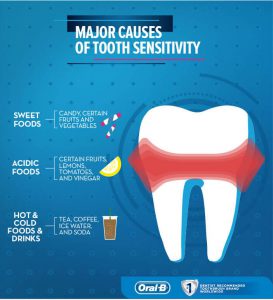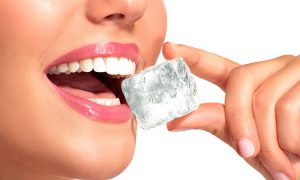Sensitive Teeth
- Home » Sensitive Teeth
Sensitive Teeth



What Causes Sensitive Teeth?
You get sensitive teeth when your gums pull back and expose the surface beneath, called the dentin. This soft layer makes up the inner part and roots, which have thousands of tiny tubes that lead to the tooth’s nerve center (the pulp). These channels allow the trigger — for example, the hot, cold, or sweet food — to reach the nerve in your tooth, which results in the pain you feel.
Other things that can cause sensitive teeth are:
- Wear and tear. Over time, brushing too hard or using a hard-bristled toothbrush or grinding your teeth can wear down enamel and expose the dentin.
- Tooth decay near the gum line.
- Gum disease (gingivitis). Inflamed and sore gums pull back and expose the roots of your teeth.
- Damage. Chipped or broken teeth may fill with bacteria. The bacteria can enter the pulp, causing inflammation.
- Teeth grinding. Grinding or clenching your teeth may wear down the enamel and expose the dentin.
- Tooth-whitening products. These products may be major contributors to sensitive teeth.
- Age. Teeth are most sensitive between ages 25 and 30.
- Plaque buildup. The presence of plaque on the root surfaces can cause sensitivity.
- Long-term mouthwash use. Some over-the-counter products contain acids that can make sensitivity worse if your dentin is already exposed. Ask your dentist about a neutral fluoride solution.
- Acidic foods. Food and drinks with a high acid content, like citrus fruits, tomatoes, pickles, and tea, can wear down enamel.
- Dental work. Teeth cleaning, root planing, crown placement, and tooth restoration can make teeth sensitive. This should go away in 4 to 6 weeks
